FORD F650 2006 11.G Owner's Manual
Manufacturer: FORD, Model Year: 2006, Model line: F650, Model: FORD F650 2006 11.GPages: 272, PDF Size: 1.86 MB
Page 21 of 272
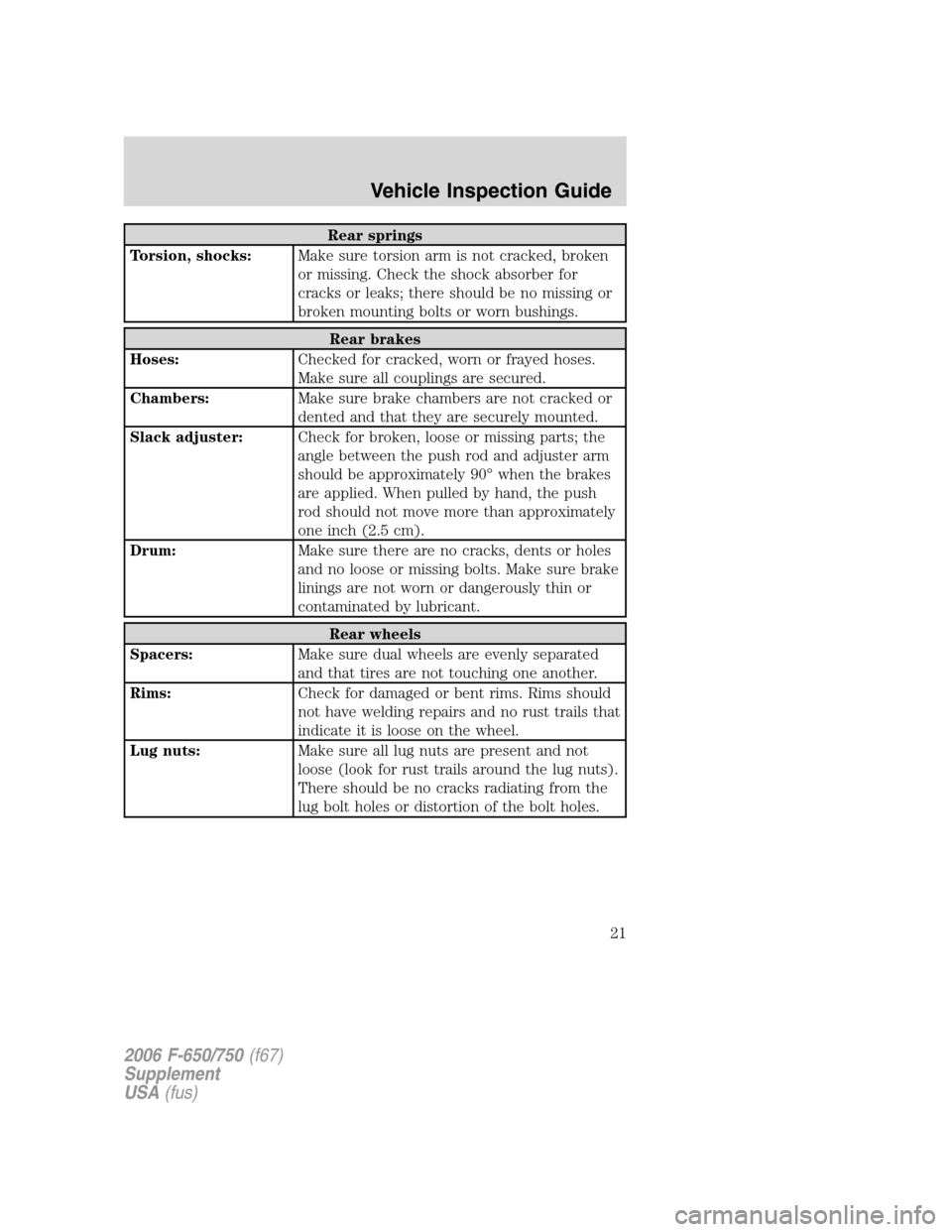
Rear springs
Torsion, shocks:Make sure torsion arm is not cracked, broken
or missing. Check the shock absorber for
cracks or leaks; there should be no missing or
broken mounting bolts or worn bushings.
Rear brakes
Hoses:Checked for cracked, worn or frayed hoses.
Make sure all couplings are secured.
Chambers:Make sure brake chambers are not cracked or
dented and that they are securely mounted.
Slack adjuster:Check for broken, loose or missing parts; the
angle between the push rod and adjuster arm
should be approximately 90° when the brakes
are applied. When pulled by hand, the push
rod should not move more than approximately
one inch (2.5 cm).
Drum:Make sure there are no cracks, dents or holes
and no loose or missing bolts. Make sure brake
linings are not worn or dangerously thin or
contaminated by lubricant.
Rear wheels
Spacers:Make sure dual wheels are evenly separated
and that tires are not touching one another.
Rims:Check for damaged or bent rims. Rims should
not have welding repairs and no rust trails that
indicate it is loose on the wheel.
Lug nuts:Make sure all lug nuts are present and not
loose (look for rust trails around the lug nuts).
There should be no cracks radiating from the
lug bolt holes or distortion of the bolt holes.
2006 F-650/750(f67)
Supplement
USA(fus)
Vehicle Inspection Guide
21
Page 22 of 272
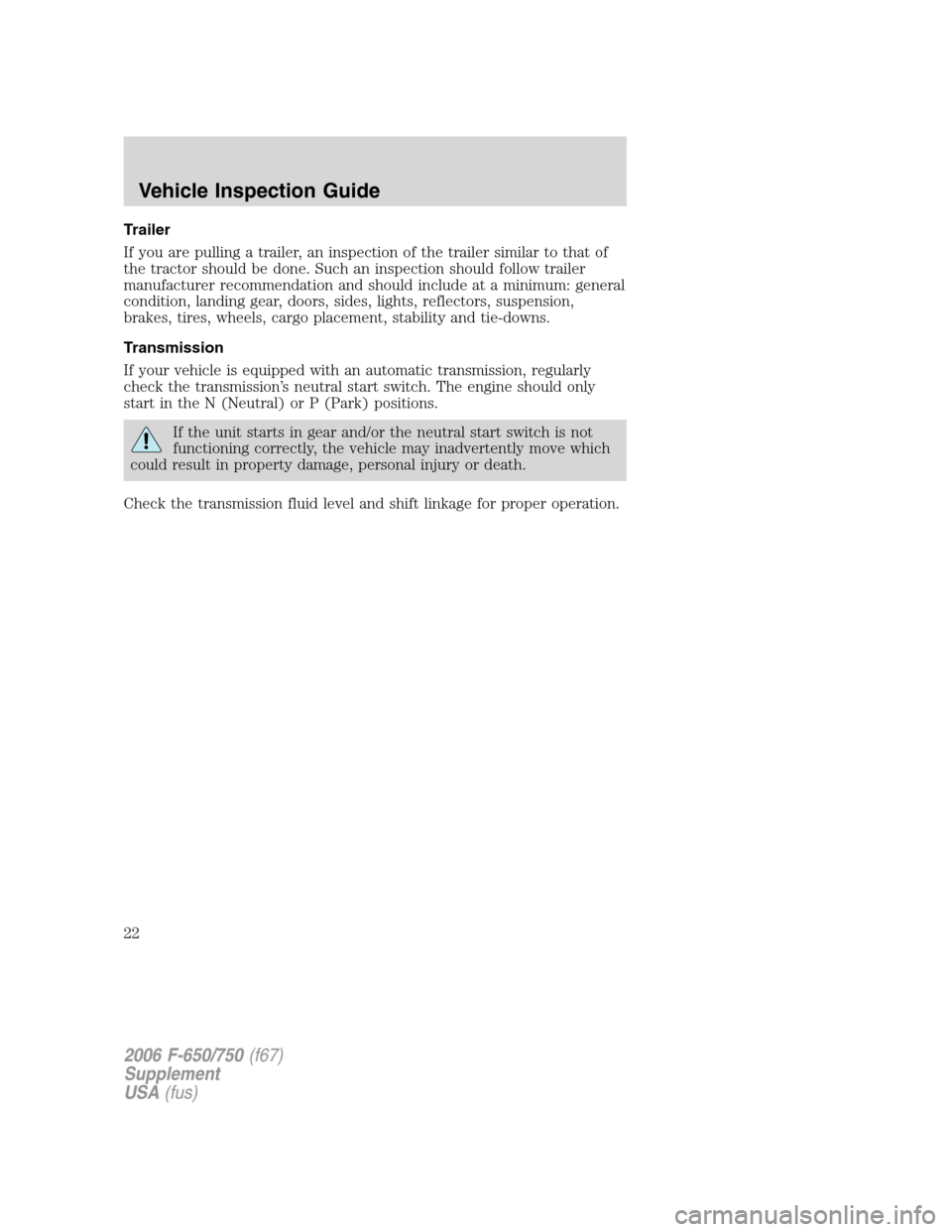
Trailer
If you are pulling a trailer, an inspection of the trailer similar to that of
the tractor should be done. Such an inspection should follow trailer
manufacturer recommendation and should include at a minimum: general
condition, landing gear, doors, sides, lights, reflectors, suspension,
brakes, tires, wheels, cargo placement, stability and tie-downs.
Transmission
If your vehicle is equipped with an automatic transmission, regularly
check the transmission’s neutral start switch. The engine should only
start in the N (Neutral) or P (Park) positions.
If the unit starts in gear and/or the neutral start switch is not
functioning correctly, the vehicle may inadvertently move which
could result in property damage, personal injury or death.
Check the transmission fluid level and shift linkage for proper operation.
2006 F-650/750(f67)
Supplement
USA(fus)
Vehicle Inspection Guide
22
Page 23 of 272
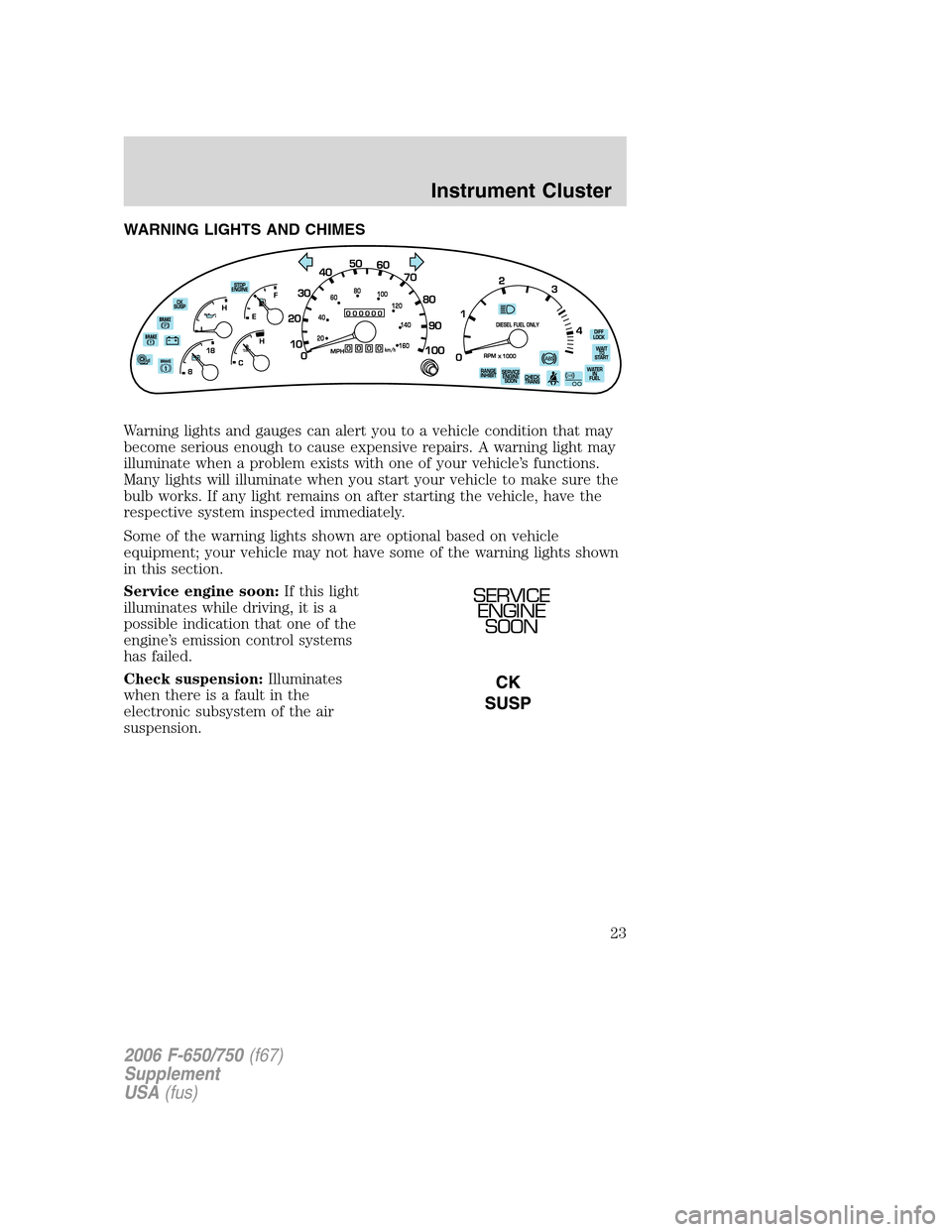
WARNING LIGHTS AND CHIMES
Warning lights and gauges can alert you to a vehicle condition that may
become serious enough to cause expensive repairs. A warning light may
illuminate when a problem exists with one of your vehicle’s functions.
Many lights will illuminate when you start your vehicle to make sure the
bulb works. If any light remains on after starting the vehicle, have the
respective system inspected immediately.
Some of the warning lights shown are optional based on vehicle
equipment; your vehicle may not have some of the warning lights shown
in this section.
Service engine soon:If this light
illuminates while driving, it is a
possible indication that one of the
engine’s emission control systems
has failed.
Check suspension:Illuminates
when there is a fault in the
electronic subsystem of the air
suspension.
SERVICE
ENGINE
SOON
2006 F-650/750(f67)
Supplement
USA(fus)
Instrument Cluster
23
Page 24 of 272
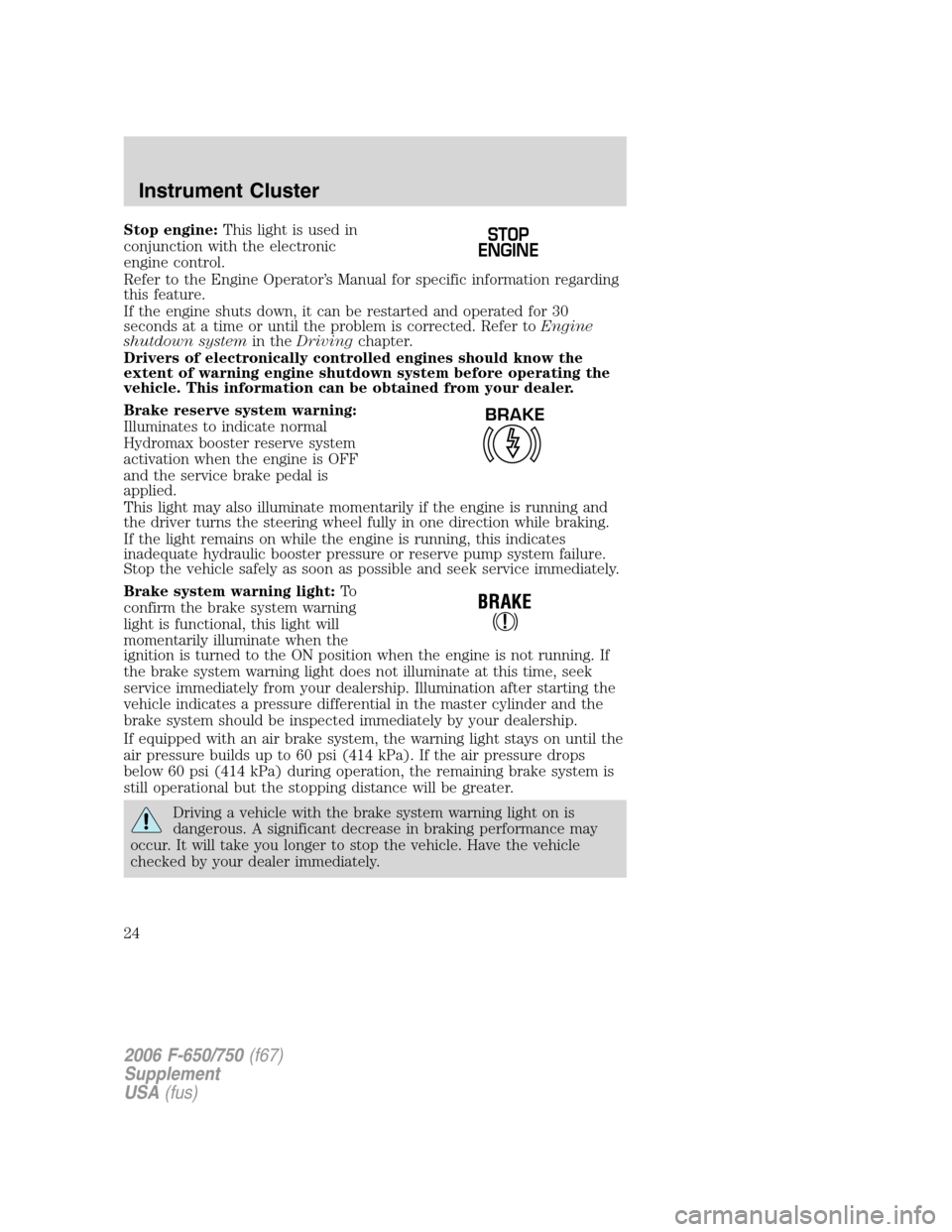
Stop engine:This light is used in
conjunction with the electronic
engine control.
Refer to the Engine Operator’s Manual for specific information regarding
this feature.
If the engine shuts down, it can be restarted and operated for 30
seconds at a time or until the problem is corrected. Refer toEngine
shutdown systemin theDrivingchapter.
Drivers of electronically controlled engines should know the
extent of warning engine shutdown system before operating the
vehicle. This information can be obtained from your dealer.
Brake reserve system warning:
Illuminates to indicate normal
Hydromax booster reserve system
activation when the engine is OFF
and the service brake pedal is
applied.
This light may also illuminate momentarily if the engine is running and
the driver turns the steering wheel fully in one direction while braking.
If the light remains on while the engine is running, this indicates
inadequate hydraulic booster pressure or reserve pump system failure.
Stop the vehicle safely as soon as possible and seek service immediately.
Brake system warning light:To
confirm the brake system warning
light is functional, this light will
momentarily illuminate when the
ignition is turned to the ON position when the engine is not running. If
the brake system warning light does not illuminate at this time, seek
service immediately from your dealership. Illumination after starting the
vehicle indicates a pressure differential in the master cylinder and the
brake system should be inspected immediately by your dealership.
If equipped with an air brake system, the warning light stays on until the
air pressure builds up to 60 psi (414 kPa). If the air pressure drops
below 60 psi (414 kPa) during operation, the remaining brake system is
still operational but the stopping distance will be greater.
Driving a vehicle with the brake system warning light on is
dangerous. A significant decrease in braking performance may
occur. It will take you longer to stop the vehicle. Have the vehicle
checked by your dealer immediately.
STOP
ENGINE
BRAKE
2006 F-650/750(f67)
Supplement
USA(fus)
Instrument Cluster
24
Page 25 of 272
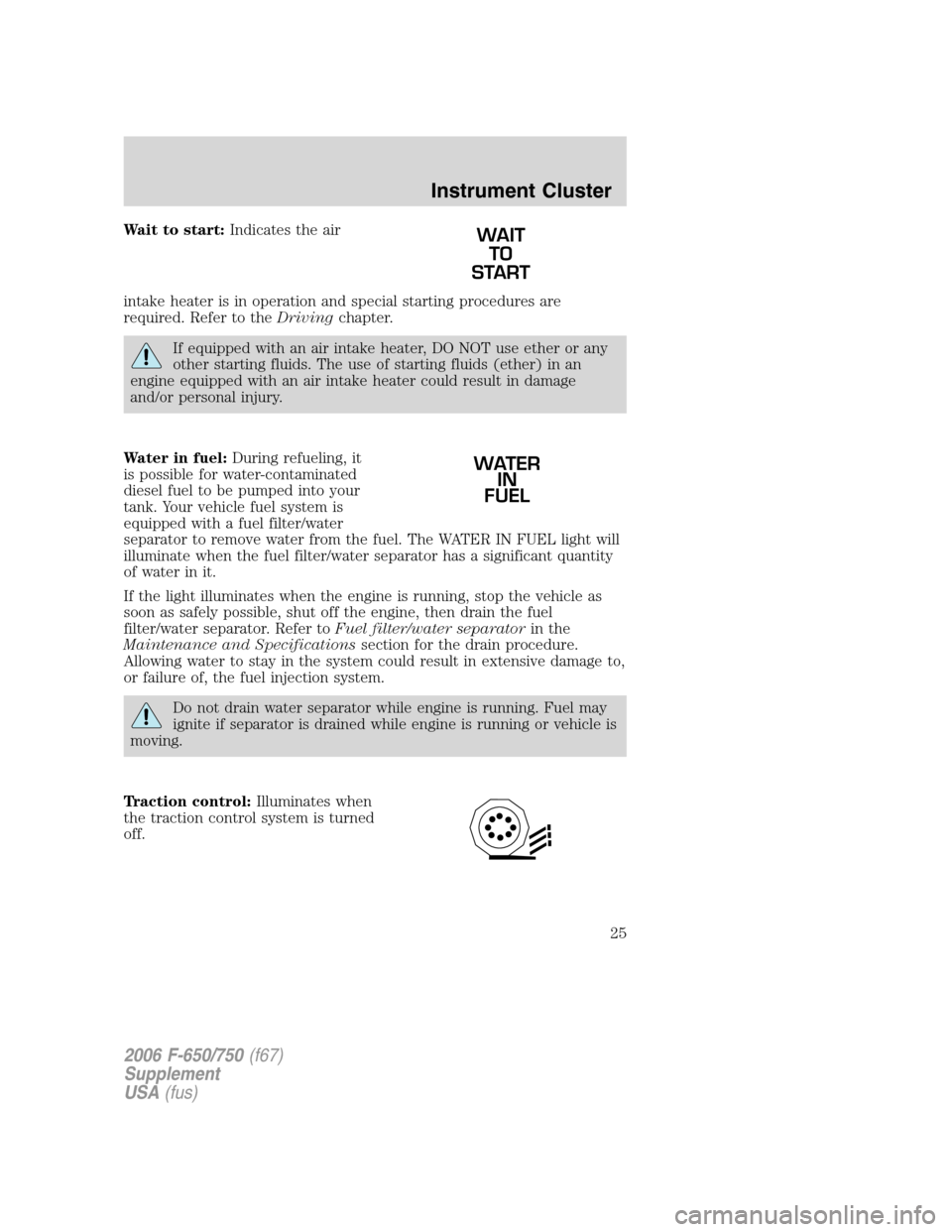
Wait to start:Indicates the air
intake heater is in operation and special starting procedures are
required. Refer to theDrivingchapter.
If equipped with an air intake heater, DO NOT use ether or any
other starting fluids. The use of starting fluids (ether) in an
engine equipped with an air intake heater could result in damage
and/or personal injury.
Water in fuel:During refueling, it
is possible for water-contaminated
diesel fuel to be pumped into your
tank. Your vehicle fuel system is
equipped with a fuel filter/water
separator to remove water from the fuel. The WATER IN FUEL light will
illuminate when the fuel filter/water separator has a significant quantity
of water in it.
If the light illuminates when the engine is running, stop the vehicle as
soon as safely possible, shut off the engine, then drain the fuel
filter/water separator. Refer toFuel filter/water separatorin the
Maintenance and Specificationssection for the drain procedure.
Allowing water to stay in the system could result in extensive damage to,
or failure of, the fuel injection system.
Do not drain water separator while engine is running. Fuel may
ignite if separator is drained while engine is running or vehicle is
moving.
Traction control:Illuminates when
the traction control system is turned
off.
WAIT
TO
START
WATER
IN
FUEL
2006 F-650/750(f67)
Supplement
USA(fus)
Instrument Cluster
25
Page 26 of 272
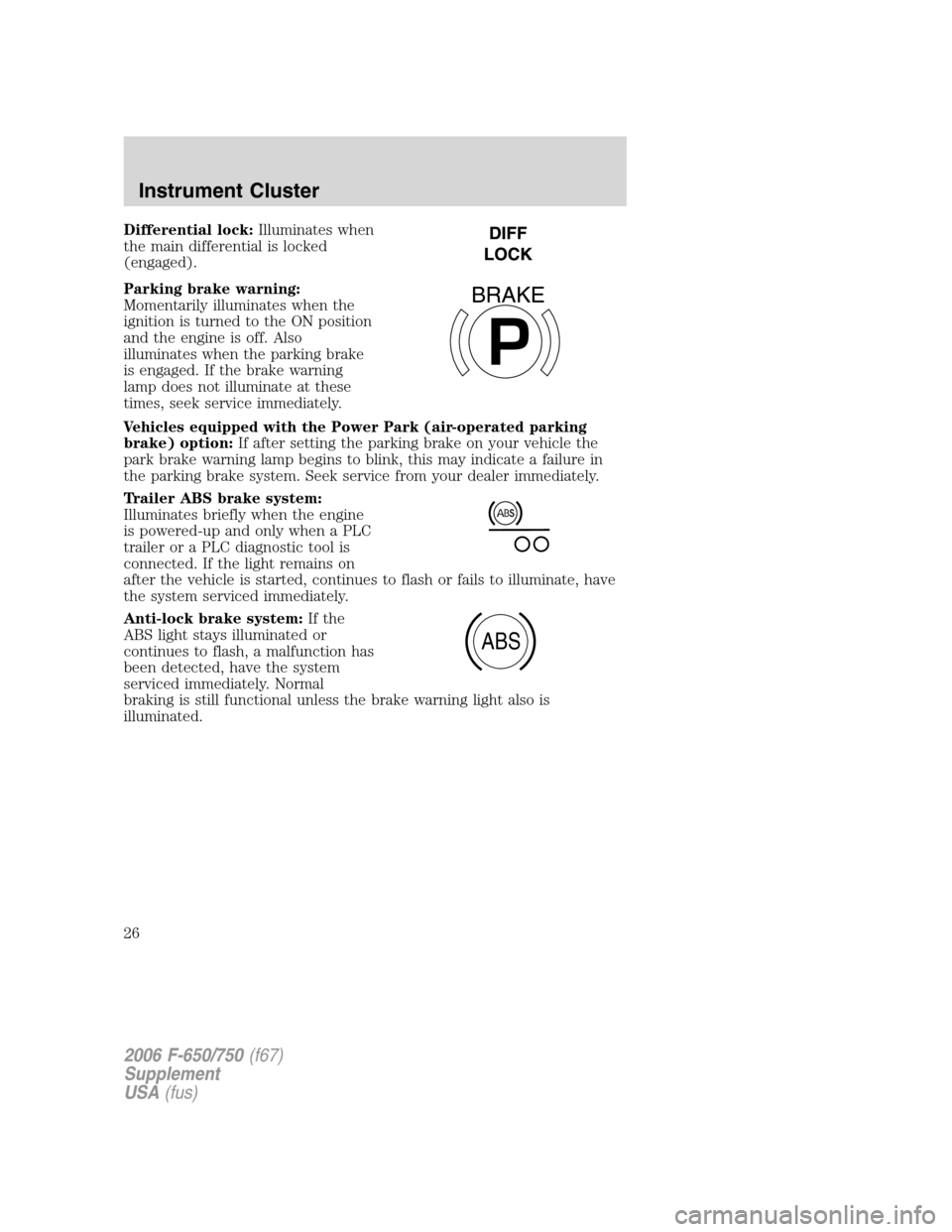
Differential lock:Illuminates when
the main differential is locked
(engaged).
Parking brake warning:
Momentarily illuminates when the
ignition is turned to the ON position
and the engine is off. Also
illuminates when the parking brake
is engaged. If the brake warning
lamp does not illuminate at these
times, seek service immediately.
Vehicles equipped with the Power Park (air-operated parking
brake) option:If after setting the parking brake on your vehicle the
park brake warning lamp begins to blink, this may indicate a failure in
the parking brake system. Seek service from your dealer immediately.
Trailer ABS brake system:
Illuminates briefly when the engine
is powered-up and only when a PLC
trailer or a PLC diagnostic tool is
connected. If the light remains on
after the vehicle is started, continues to flash or fails to illuminate, have
the system serviced immediately.
Anti-lock brake system:If the
ABS light stays illuminated or
continues to flash, a malfunction has
been detected, have the system
serviced immediately. Normal
braking is still functional unless the brake warning light also is
illuminated.
P
BRAKE
ABS
2006 F-650/750(f67)
Supplement
USA(fus)
Instrument Cluster
26
Page 27 of 272
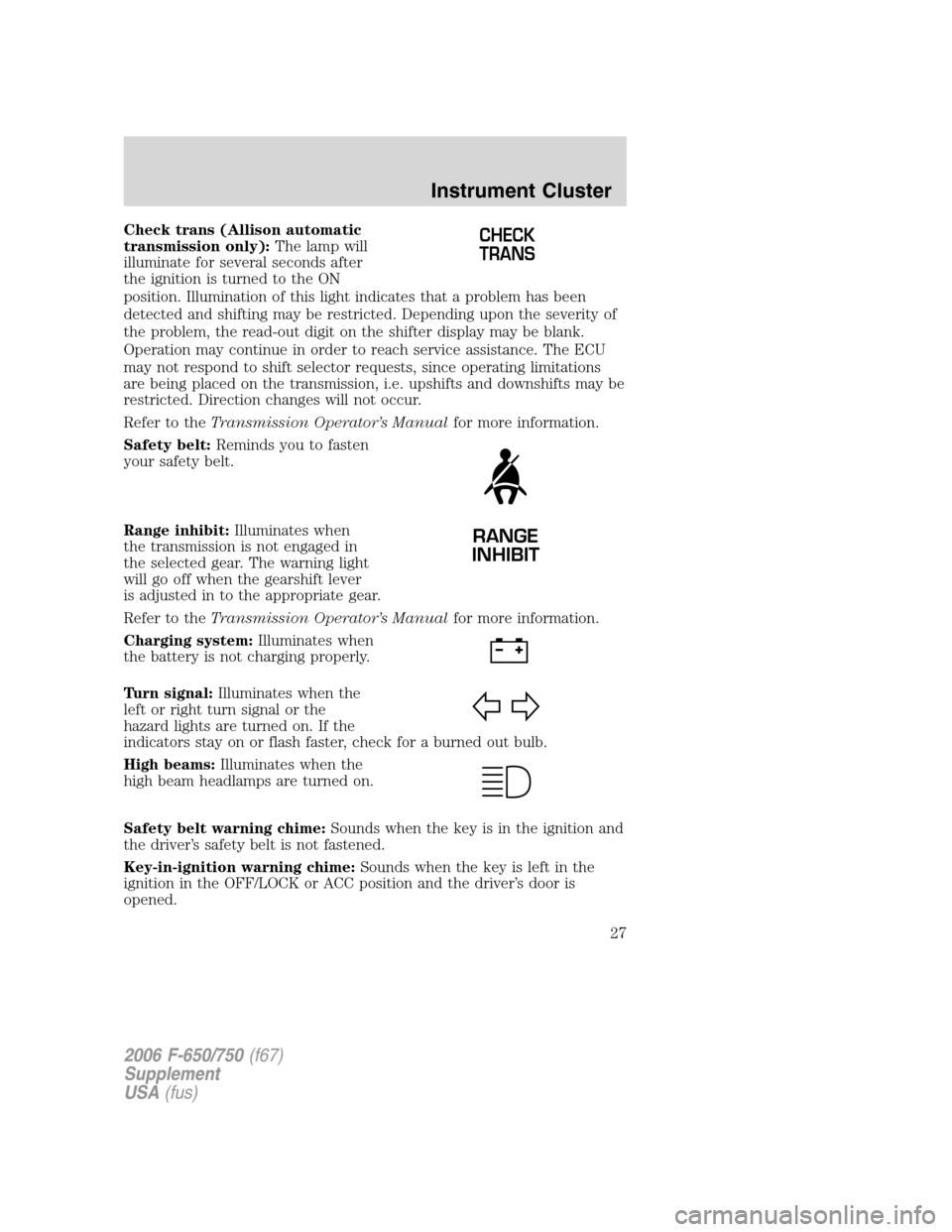
Check trans (Allison automatic
transmission only):The lamp will
illuminate for several seconds after
the ignition is turned to the ON
position. Illumination of this light indicates that a problem has been
detected and shifting may be restricted. Depending upon the severity of
the problem, the read-out digit on the shifter display may be blank.
Operation may continue in order to reach service assistance. The ECU
may not respond to shift selector requests, since operating limitations
are being placed on the transmission, i.e. upshifts and downshifts may be
restricted. Direction changes will not occur.
Refer to theTransmission Operator’s Manualfor more information.
Safety belt:Reminds you to fasten
your safety belt.
Range inhibit:Illuminates when
the transmission is not engaged in
the selected gear. The warning light
will go off when the gearshift lever
is adjusted in to the appropriate gear.
Refer to theTransmission Operator’s Manualfor more information.
Charging system:Illuminates when
the battery is not charging properly.
Turn signal:Illuminates when the
left or right turn signal or the
hazard lights are turned on. If the
indicators stay on or flash faster, check for a burned out bulb.
High beams:Illuminates when the
high beam headlamps are turned on.
Safety belt warning chime:Sounds when the key is in the ignition and
the driver’s safety belt is not fastened.
Key-in-ignition warning chime:Sounds when the key is left in the
ignition in the OFF/LOCK or ACC position and the driver’s door is
opened.CHECK
TRANS
RANGE
INHIBIT
2006 F-650/750(f67)
Supplement
USA(fus)
Instrument Cluster
27
Page 28 of 272
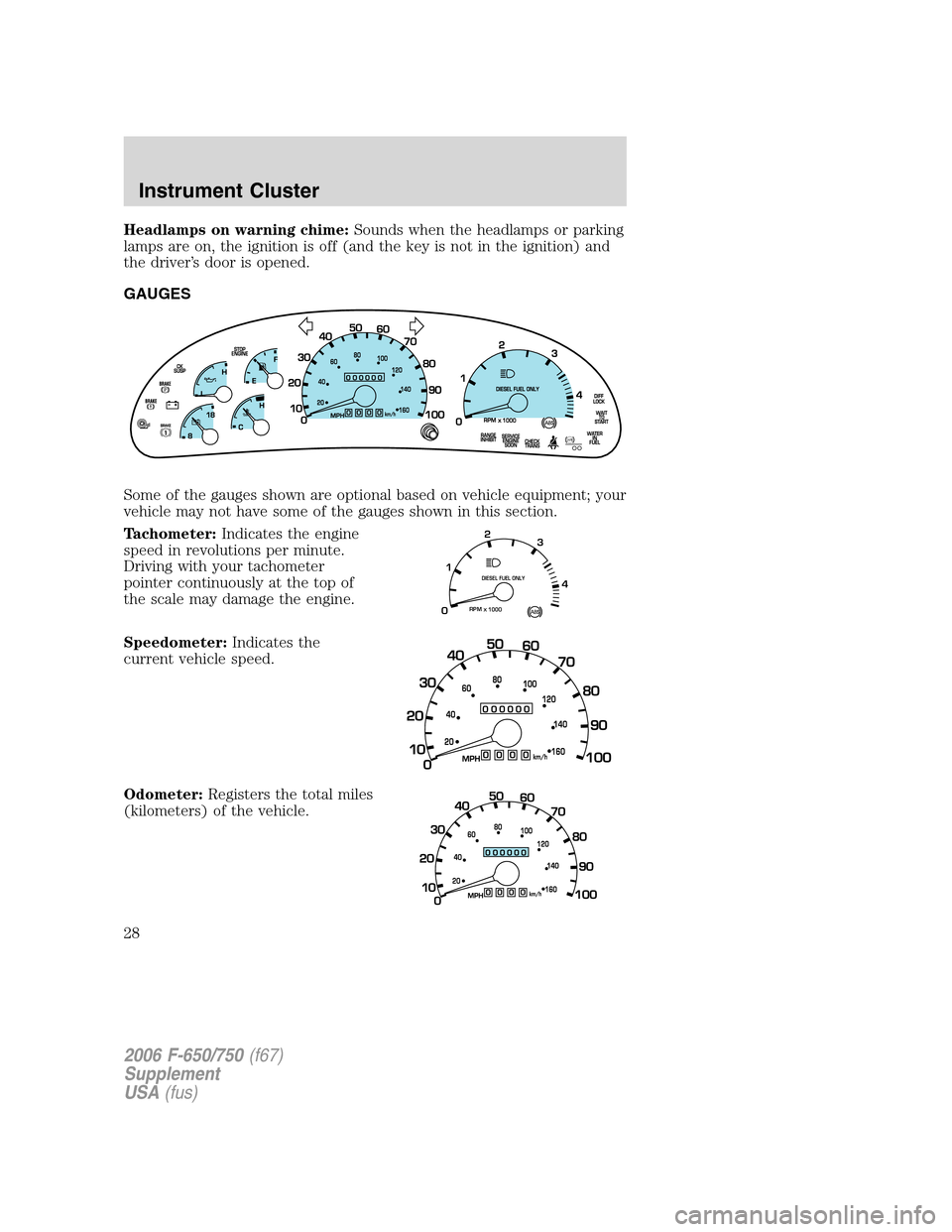
Headlamps on warning chime:Sounds when the headlamps or parking
lamps are on, the ignition is off (and the key is not in the ignition) and
the driver’s door is opened.
GAUGES
Some of the gauges shown are optional based on vehicle equipment; your
vehicle may not have some of the gauges shown in this section.
Tachometer:Indicates the engine
speed in revolutions per minute.
Driving with your tachometer
pointer continuously at the top of
the scale may damage the engine.
Speedometer:Indicates the
current vehicle speed.
Odometer:Registers the total miles
(kilometers) of the vehicle.
RPM1000
DIESEL FUEL ONLY
X012
3
4
2006 F-650/750(f67)
Supplement
USA(fus)
Instrument Cluster
28
Page 29 of 272
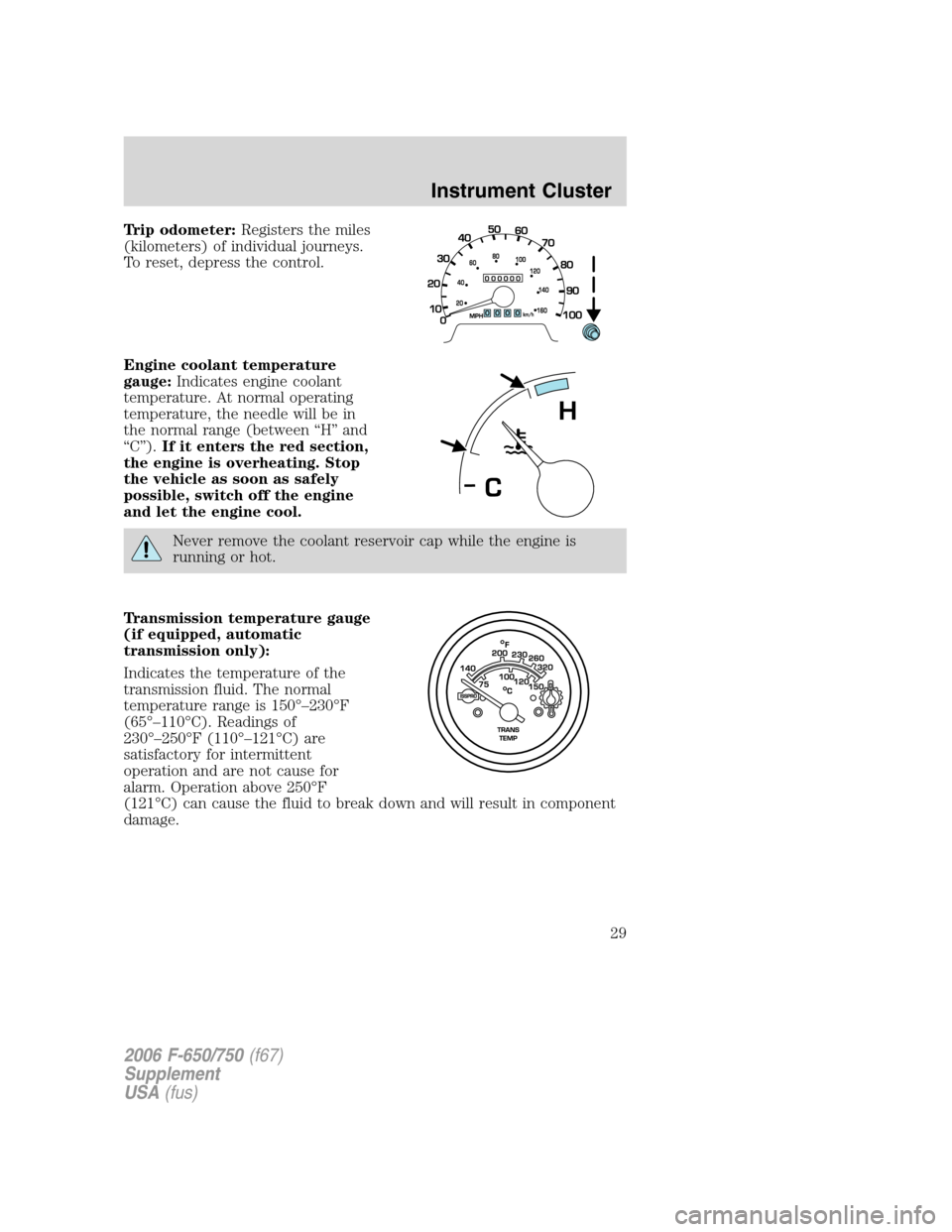
Trip odometer:Registers the miles
(kilometers) of individual journeys.
To reset, depress the control.
Engine coolant temperature
gauge:Indicates engine coolant
temperature. At normal operating
temperature, the needle will be in
the normal range (between “H” and
“C”).If it enters the red section,
the engine is overheating. Stop
the vehicle as soon as safely
possible, switch off the engine
and let the engine cool.
Never remove the coolant reservoir cap while the engine is
running or hot.
Transmission temperature gauge
(if equipped, automatic
transmission only):
Indicates the temperature of the
transmission fluid. The normal
temperature range is 150°–230°F
(65°–110°C). Readings of
230°–250°F (110°–121°C) are
satisfactory for intermittent
operation and are not cause for
alarm. Operation above 250°F
(121°C) can cause the fluid to break down and will result in component
damage.
H
C
2006 F-650/750(f67)
Supplement
USA(fus)
Instrument Cluster
29
Page 30 of 272
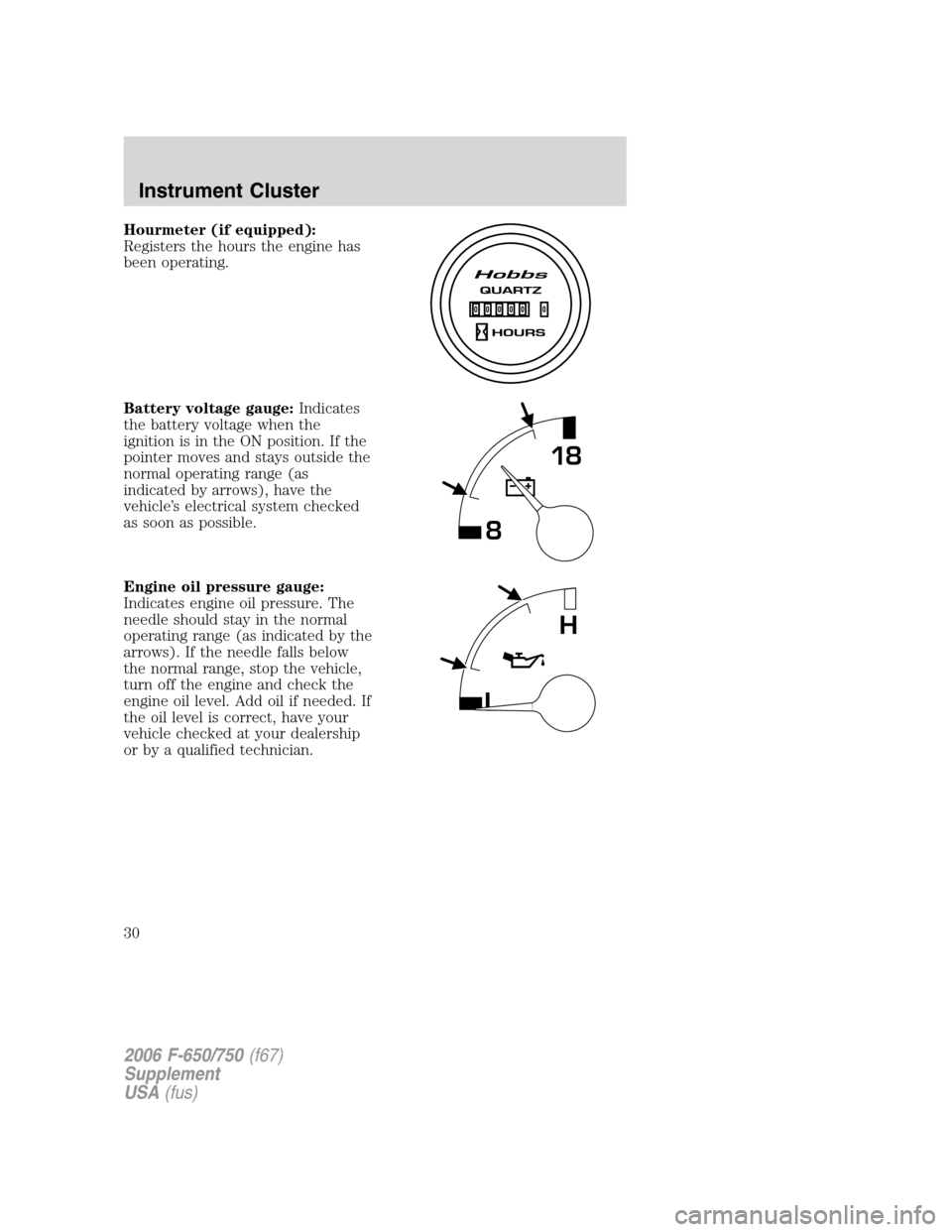
Hourmeter (if equipped):
Registers the hours the engine has
been operating.
Battery voltage gauge:Indicates
the battery voltage when the
ignition is in the ON position. If the
pointer moves and stays outside the
normal operating range (as
indicated by arrows), have the
vehicle’s electrical system checked
as soon as possible.
Engine oil pressure gauge:
Indicates engine oil pressure. The
needle should stay in the normal
operating range (as indicated by the
arrows). If the needle falls below
the normal range, stop the vehicle,
turn off the engine and check the
engine oil level. Add oil if needed. If
the oil level is correct, have your
vehicle checked at your dealership
or by a qualified technician.
818
L
H
2006 F-650/750(f67)
Supplement
USA(fus)
Instrument Cluster
30